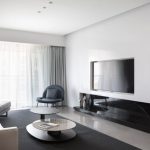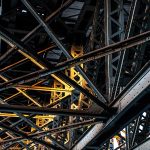
KLAR was asked to design a two-generation home that would be made of wood, cost-effective and easy to build, partially even by the clients themselves. Responding to the brief, building limitations and surrounding picturesque landscape, two elongated volumes with pitched roofs intersect at an angle, creating a vestibule that acts as a metaphoric entrance signpost and separates two living units. A wide deck, shaded by the roof overhang, stretches along the house and connects it to a private courtyard overlooking the nearby forest.

From the architects:
Place
Located on the south edge of the Rybí village, Moravian-Silesian Region, the building site is marked out by the edge of the access road, the local stream and neighbouring property fencing. It is a sizeable plot of land, but with a significantly reduced buildable area. The shape of the future house is in fact largely predetermined by the minimum required setbacks from existing underground gas storage tanks and from the forest edge.
RELATED: FIND MORE IMPRESSIVE PROJECTS FROM THE CZECH REPUBLIC
Sloping gently to the southeast, the site offers picturesque views of the surrounding pastures, woods, and village houses. The access road crosses the stream at the lowest point of the site and there is a small wayside cross with a simple bench. This spot is accessible to the public despite being on the clients’ property. For centuries, it has been part of the Way of the Cross from Nový Ji?ín to Štramberk.



Brief
The clients specified that the building program should include a home for a family of four and a separate unit for their grandparents. They wanted the house made of wood and also sustainable in the sense that it should be easy to build and cost-effective in operation. They also wanted to be able to build the house themselves, at least partially.

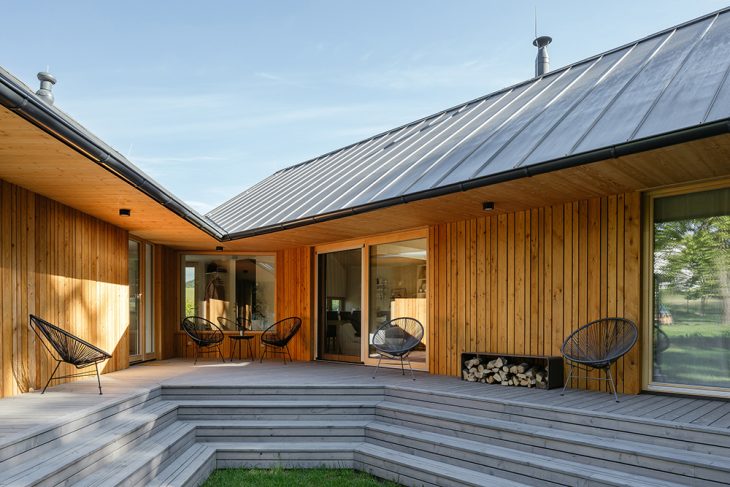


Concept
There are almost no neighbouring buildings around this greenfield site that would define structure or form. Two pitched-roofed catalogue houses are standing close by, the rest of the village is a mix of detached single-family homes from various periods. Answering the question: “What should the new house look like?” was quite difficult in this case. After considering the budget limitations, program requirements, and the preferred choice of a wood structure building, our final decision was to adopt a rational approach with repeating structural elements.
Two elongated volumes with pitched roofs are joined together at an angle and placed on the edge of the buildable area, defined by the setbacks. At first glance, this shape can appear to be reminiscent of the Beskydy region’s typical small single-story home with a pitched roof. The solution with two wings works well to separate the family home and the future in-law suite. A south-facing private courtyard is formed inside the angle, protected from the north and overlooking a nearby forest. Shaded by the roof overhang, a wide deck stretching all the way along the house connects it with the courtyard, offering endless possibilities to sit, relax and listen to the sounds of running water, rustling leaves, or distant hum of village life. Mature trees growing around the stream provide shade from the hot summer sun, but their bare branches let in enough sunlight to reach the house in winter.

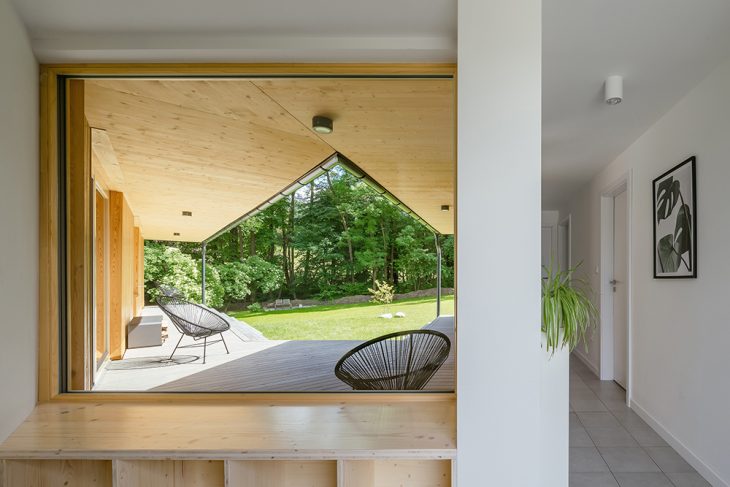

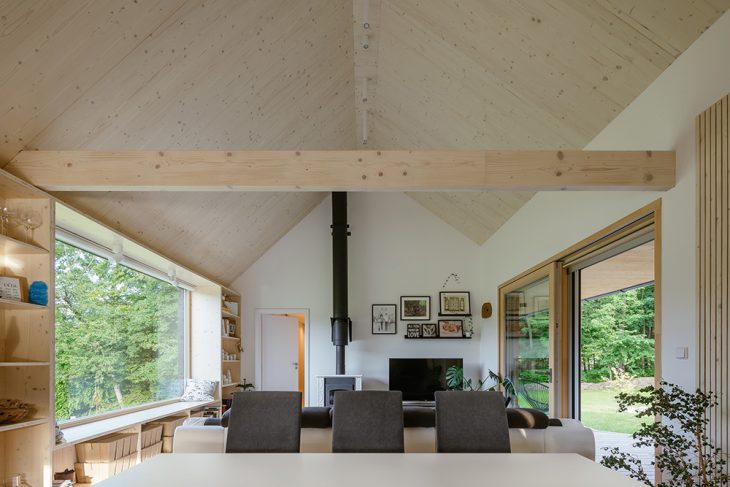
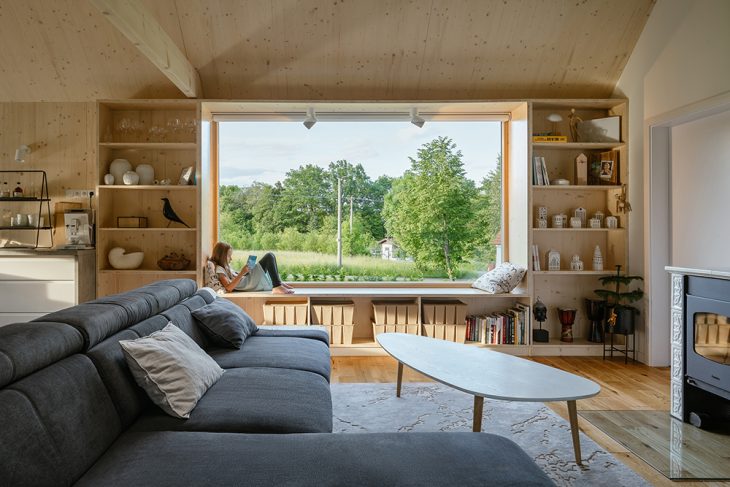
Layout
The two wings intersect at the vestibule. This room gives a good overview of both wings, the courtyard and the deck, acting as a metaphoric entrance signpost. From the vestibule, on one side a door leads to the main living area, while on the other we enter a corridor to the in-law suite. The corridor goes along the east side of the in-law suite and provides access to the mechanical room, the smaller bathroom and the grandparent’s bedroom. It also connects this wing to the deck.
Entering the family wing from the vestibule, we reach a double-height, open-plan living area with dining and cooking. Providing enough views inside and outside the house was emphasised here and everywhere around the building. From the cooking area, a horizontal strip window overlooks the entryway, while a wide window seat in the living area offers views of the landscape beyond. A corridor connects the living area with the private zone consisting of the children’s bedroom, the main bathroom and the main bedroom. The open-plan living area and the bedrooms all have direct access to the deck.
Structure and Materials
Load bearing structure
The house was erected using the 2-by-4 structural system, mineral wool insulation and structural OSB board sheathing. The dominant interior finishes are natural 3-layer spruce solid wood panel and white gypsum board. The bedrooms have oak flooring, the corridors and bathrooms ceramic floor tiles.
Foundations
The foundations are divided into two sections. The in-law suite uses reinforced concrete strip foundation while the family home is raised from the ground on thin steel stilts. This gives a certain lightweight quality to the building, reducing its scale and impact on the soil.
Heating
The house is fitted with water underfloor heating powered by an electric boiler. Additional heating with a wood-burning stove is available in the living area, and a heated towel radiator in the bathroom.
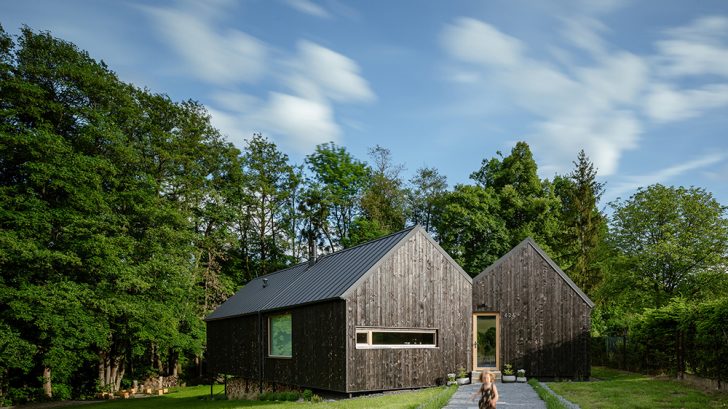
Studio: KLAR – www.klarch.cz
Author: Václav Kocián, Zden?k Liška
Project location: Rybí 424, 742 65 Rybí
Project country: Czech Republic
Project year: 2019-2020
Completion year: 2021
Built-up Area :145 m²
Usable Floor Area: 124 m²
Plot size: 2161 m²
Dimensions: 722 m3 volume
Cost: 200 000 €
Photographer: Václav Novák – www.vaclavnovak.com
Collaborator
Structural engineering: Martin Wünsche
Fire safety engineering: Pavla Tvrdá
Contractor: Richard Ková?
EPC: Tomáš Brückner


